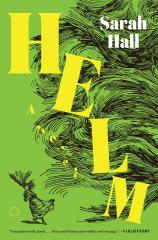Helm
Review
Helm
In the back matter of Sarah Hall’s HELM is a maker’s mark that reads “HUMAN WRITTEN,” emphasizing that this book was not produced by artificial intelligence. I certainly appreciate this clarification. But honestly, in the case of this almost assertively creative novel, there’s really no doubt that it is the product of a human mind, and a vigorously inventive one at that.
HELM traces human history in the north of England through the story of its titular phenomenon, the only named wind in England. It begins from the point of view of Helm itself, as it observes eons of evolution and prehistory while going largely unnoticed by the flora and fauna living out their lives below it. That is, until humans come along: “It is when humans evolve that things become interesting. Because humans become interested in Helm.”
"HELM is an expansive work of fiction, but it’s also a brilliantly relevant one... How lucky readers are to have this gift of a novel from Sarah Hall’s wild, strange, splendid imagination."
Helm, as Hall chronicles, has been known by humans for millennia and has gone by many names, but it has never gone unnoticed. In all the stories that Hall tells, how humans think about Helm reflects the ways that they understand the natural world more broadly. Early on --- and even lingering into recent history --- humans view Helm with suspicion or superstition. In the Neolithic period, for example, the society imagines Helm as a passageway between worlds, and a woman who was once lost for dead during a particularly bad windstorm eventually leads her people to complete an imposing monument based on a vision she had in the midst of that storm. During the medieval period, a mysterious stranger is convinced that Helm conducts demonic forces and grows obsessed with carrying a cross to the peak of a mountain in order to dispel those evils.
Even when science starts to enter the picture, superstition --- and tragedy --- is rarely far behind. In the Victorian era, a scientist embarks on a study of Helm in part to escape coping with his wife’s rapidly progressing cancer, only to have his negligence come back to haunt him. Much later, in our present day, a climate scientist who views her new posting in an isolated weather station as working at “the end of the world” in more ways than one contends with fears of doxxing by climate skeptics who constantly harass her online.
Initially, when it’s being narrated by the wind itself, HELM feels like it might be loose or abstract, unmoored from human concerns. But Hall soon brings in these very concrete, historically grounded human stories that will draw readers in. Some of them, like those I’ve outlined above, unfold gradually in parts throughout the novel. Others --- like the tragic story of a troubled young woman in the mid-20th century who believes she’s fallen in love with Helm --- appear in just a handful of installments. Hall, a master of the short story form, utilizes her skills to their maximum, creating whole worlds and characters in relatively confined spaces. She also uses language masterfully, including countless words that will be wildly unfamiliar to modern readers but are authentic to the times she’s writing about.
HELM is an expansive work of fiction, but it’s also a brilliantly relevant one, as the contemporary climate scientist is intent on discovering if microplastics in the atmosphere are responsible for the perception that Helm is weakening in power. The novel ends much as it began, from the perspective of Helm itself, as the wind muses no longer about its own creation but instead about its potential demise: “If it ends, Helm isn’t sorry. The contributions were amazing, if a little puzzling now and then, and sometimes crazy…. Stories. So many stories. Helm would not be Helm without your brilliant, curious, silly imaginations.”
How lucky readers are to have this gift of a novel from Sarah Hall’s wild, strange, splendid imagination.
Reviewed by Norah Piehl on November 8, 2025
Helm
- Publication Date: November 4, 2025
- Genres: Fiction
- Hardcover: 368 pages
- Publisher: Mariner Books
- ISBN-10: 0063439948
- ISBN-13: 9780063439948




